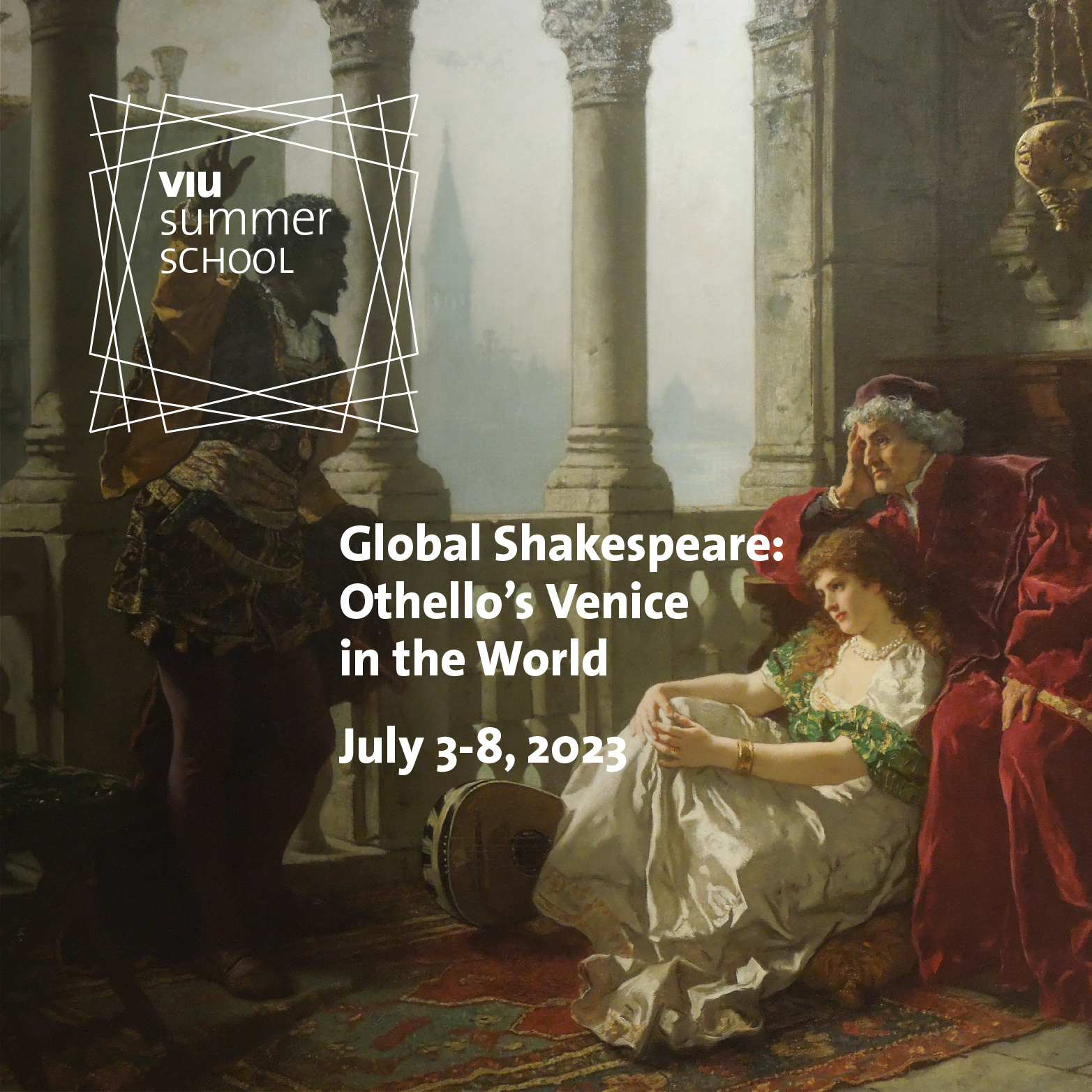July 3-8, 2023 | 2nd Edition
Call for applications: Cancelled
The aim of the Summer School is to gather an international cohort of graduate students for a week-long, multi-faceted exploration of one of the most timely topics in the interdisciplinary humanities: Shakespeare’s global contexts and futures. In order to provide focus and coherence, the play Othello, set in multicultural Venice, will be taken as a case study throughout the summer school.
“Shakespeare” is now a global vernacular—a resonant language available throughout the world as a form of self-expression and enquiry. Written at a time of incipient globalisation, Othello both represents and challenges the fraught dynamics of international cultural contact. By offering troubling insights into the development of the discourse of race, and by coupling that discourse to an unstable conflict between Christianity and Islam, the play speaks powerfully to our own world of religious, ethnic, and national antagonism.
“Global Shakespeare” invites students to imagine alternatives to this increasingly fractured world. Using Shakespeare’s poetry and dramaturgy as a resource, it asks participants to consider how connections can be made across languages, religions, and nation states. The school’s multi-disciplined approach will involve students in literary analysis, politics, and theatrical performance by focusing on the intersection of (1) Shakespeare’s England and its growing interest in global connections; (2) Venice as a Renaissance site of global interaction; and (3) a twentieth-century world increasing riven, especially in the Mediterranean and its adjoining regions, by racial and religious antagonisms.
Faculty
Kevin Curran, Professor of Early Modern Literature, University of Lausanne, Switzerland; President of the Lausanne Shakespeare Festival (Scientific Coordinator)
Pascale Aebischer, Professor of Shakespeare and Early Modern Performance Studies, University of Exeter, UK
David Schalkwyk, Director of Global Shakespeare, Queen Mary University, UK
Alessandra Petrina, Professor of English Literature, University of Padua, Italy
Rocco Coronato, Professor of English Literature, University of Padua, Italy
Elena Pellone, Venice Shakespeare Company, Italy
Who is it for?
Graduate students (MA and PhD) from various disciplines: Literary Studies, Shakespeare Studies, Theater and Performance Studies, History, Politics, Philosophy, Anthropology, Media and Film Studies, Cultural Studies, Art, Gender Studies, Queer Studies. Advanced undergraduate students will also be considered.
Methodology and structure
Each day will begin with a lecture from a different disciplinary standpoint, which will be followed by a two-hour seminar discussion. Afternoons will be spent in the workshop where the ideas explored in the morning will be tested through embodied theatrical experimentation. These workshops will be with actors from the Venice Shakespeare Company. Notions abstracted on the page will take concrete form by getting participants “on their feet”. They will use the rich variability of Shakespeare’s language to try out, person to person, ideas about race and power, religion and intolerance, and humanity. Casting will be multi-lingual and race- and gender-blind in order to put maximum pressure on cultural expectations.
The course will culminate in a collaborative discussion including all students and staff that features the performance of scenes from Othello by the professional actors from the Venice Shakespeare Company.
Level of students and suitable field of study
Graduate students (MA and PhD) from various disciplines: Literary Studies, Shakespeare Studies, Theater and Performance Studies, History, Politics, Philosophy, Anthropology, Media and Film Studies, Cultural Studies, Art, Gender Studies, Queer Studies.
Learning outcomes
- A clear historical sense of the way Shakespeare’s works are imbricated in a global world of commerce, ideas, and performance, both in Shakespeare’s time and our own.
- A nuanced theoretical understanding of globalism and cosmopolitanism, and especially of the unique ways in which Shakespeare’s writing and dramaturgy contribute to a long tradition of thought on these topics.
- An appreciation for the way performance constitutes not only a creative practice, but also a form of applied and embodied critical thought, one especially useful for exploring the meanings and implications of a “global Shakespeare".
Fees
Students of VIU member universities:
€ 650 incl. VAT.
Students of other universities:
€ 1250 incl. VAT.
The fees will cover tuition, course materials, lunches in the San Servolo cafeteria (6 working days on campus), and social events.
Student participants will be responsible for covering their own travel expenses to and from Venice, accommodation and local transportation.
VIU Alumni are eligible for a reduced fee.
PhD candidates and post-docs from EU universities may be eligible for Erasmus+ mobility grant support. Candidates should consult the International Office in their own university for information about the calls for applications for funding. VIU will provide any supporting documentation requested for such applications. Contact VIU Erasmus office: erasmus@univiu.org
Accommodation
Venice International University offers its support to book accommodation on San Servolo Campus, in multiple rooms (triple/quadruple) with other participants for the duration of the Summer School. Further information about costs is provided in the brochure and application form.
Applicants must submit the application form, a short motivation letter, a curriculum vitae, and a passport photo.
Number of students:
The Program will admit up to 30 student participants.
Credits
Number of ECTS equivalence: 3
Students will receive a certificate of attendance at the end of the course.
For further information:
summerschools@univiu.org



























